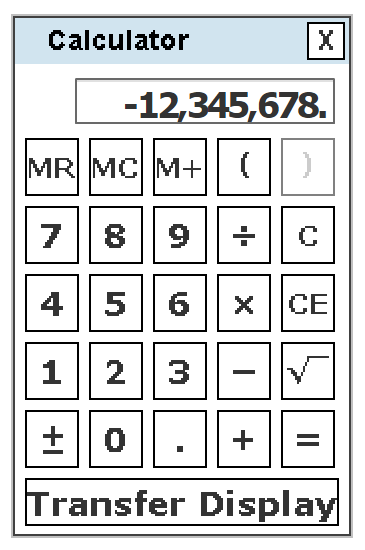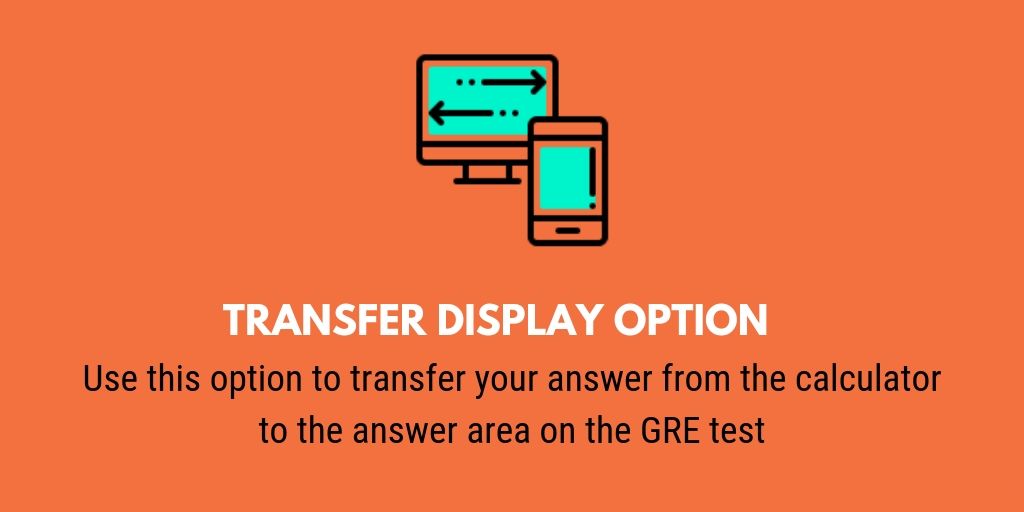Did you know that you get to use an on-screen GRE calculator while solving the test?
Countless GRE test-takers routinely rejoice over the fact that you can use a calculator during the test. Little do they know what a massive trap that really is!
If you’re one of the people celebrating the existence of this calculator, we’re sorry to burst your bubble, but for the most part, the GRE calculator is bad news. There are, of course, situations in which it comes in handy. But unless you’re careful, it will do you more harm than good!
In this blog, we will discuss:
- What is the GRE Calculator like?
- When Should You Use the GRE Calculator?
- Tips to Avoid Depending on the GRE Calculator
Let us answer each of these questions one at a time.
1. What is the GRE Calculator like?
It would be an understatement to call this calculator ‘basic’. Here, look for yourself:

As you can see, this calculator can only perform five functions: addition, subtraction, multiplication, division, and finding square roots. Not what you hoped for?
Well, join the club of disappointed GRE test-takers.
You probably already understand that this limited-function calculator is not going to be of much help on the day of your test. Still, it is important to understand a couple of things about this tool before you make up your mind about whether or not you should use it.
The GRE calculator does not take inputs from your keyboard, you have to use the mouse to click the keys.
Further, depending on the sensitivity setting of the mouse you’ll be given at the test center, you will have to adjust the way you click on these buttons. You may end up getting multiple entries or no entries at all.
And no, you won’t have time before the test begins to familiarize yourself with this calculator and figure out how lightly or hard you need to click to get the result you want.
Now you’re probably wondering why the ETS would even bother providing a calculator if it is so badly designed, or why they can’t provide a better one. Worry not, there are perfectly reasonable explanations for all these things.
The ETS caters to students from all over the world, and in most countries, students are accustomed to using calculators during their math exams. Believe it or not, the Indian system of doing all the heavy lifting in your mind is not common. So, the ETS is obliged to allow you to use a calculator.
The calculator is provided instead of allowing you to bring your own to maintain uniformity among test-takers worldwide. It is deliberately rudimentary for various reasons, one of which is that the GRE wants to see if you will fall for it and end up wasting your time.
We will discuss the logic behind why this tool is so basic in the subsequent sections since it is a rather nuanced question.
2. When Should I Use the GRE Calculator?
Based on the previous section, you’re probably thinking you need to steer clear of this thing altogether. However, that’s not what we recommend.
There are specific benefits to using this calculator in spite of all its shortcomings.
1. Numeric Entry
This particular calculator comes with an option to ‘Transfer Display’. The Transfer Display option allows you to enter the displayed number as your answer in a Numeric Entry question.

Since these are not multiple choice questions, you have to calculate and enter your answer manually. Often, misreading or mistyping could lead to you entering the wrong answer. This option helps avoid that.
2. Specific Calculations
Some questions on GRE Quant might be tricky because they involve non-whole numbers. For example, if you need to multiply 34.69 by 3.82, you may end up doing it faster using the calculator.
However, if you have faith in your mental math abilities, you could probably do these calculations yourself as well.
The trick is to use the calculator once or twice as a test run before you decide to use or ignore it for the rest of the test. You could try using it to solve a question or to do some random calculations off the top of your head.
What you need to do is to get a feel of how it works, how fast or slow it is, and how comfortable you are with using it. After that, it’s up to you to decide whether it will be faster to use that calculator or to do the math on your own.
In any case, we recommend avoiding this calculator altogether. Here’s why:
This calculator comes as a part of a few traps that are put in place for you by the ETS. So, the reason we tell you to avoid using it is tied to why a badly designed calculator is provided on the GRE in the first place.
Trap #1: If you don’t do your research, you will assume that the GRE calculator is like any other virtual calculator you can find on the internet. Under this assumption, you will not practice doing basic calculations on your own as a part of your prep. You will depend on the calculator for that and end up getting massively slowed down because of it.
Trap #2: The GRE calculator makes you pick between speed and accuracy. Doing the math on your own boosts speed at the cost of accuracy. Using the calculator boosts accuracy at the cost of speed. Which option you choose to go with shows what you prioritize.
3. Tips to Avoid Depending on the GRE Calculator
The first thing we suggest is to start with your GRE prep strategy. You need to get accustomed to solving GRE-level questions without even thinking about using a calculator well before your test day.
Here are five things you can do to avoid using the calculator altogether:
1. Practice Solving GRE Questions Without a Calculator

Don’t use a calculator right from the moment you begin your GRE prep.
You should be able to get through your entire prep period without using any calculator, virtual or physical. The more often you solve something without resorting to calculators, the faster your mind will get with numbers.
Think of calculators the way you might think of drugs – it may get your job done for the moment, but in the long run, this is going to do you more harm than good. And honestly speaking, depending on calculators is quite addictive, too. It is convenient and quick when you can use your own calculator, but trust us, if you do this, you’ll be in trouble – because the GRE calculator is neither convenient nor quick.
Solve simple arithmetic sums, irrespective of whether they’re related to the GRE or not. The idea is simply to get your brain into the rhythm of dealing with numbers without external help.
The best thing to do is to ensure that you don’t wait till the last moment to practice solving without a calculator.
2. Convert Percentages to Fractions

The two types of questions for which you’re likely to use the calculator are those involving percentages and those based on data interpretation. These questions will typically come with non-whole numbers.
It’s tougher to calculate decimal points than it is to calculate whole numbers without calculators. So, when you see a percentage question, especially one with a decimal point, feel free to convert that into a fraction. That way, you have whole numbers to deal with.
Doing this should make it much easier to handle than numbers with decimal points.
However, you most probably won’t master this overnight. So take the time to practice converting percentages to fractions while solving, lest you make silly mistakes on your GRE.
3. Learn the Art of Guesstimation

Luckily for us all, the GRE mostly has multiple choice questions. Apart from Numeric Entry questions, all others come with options you have to pick from.
Now, there may be some questions with answer options that are quite close to each other. It will be tougher to take guesses on these questions. However, most questions come with answer options that are spread wide apart. This is the type of question that you can handle without even having to do any real math.
The art of guesstimation involves taking an educated guess.
That basically means you don’t need to break your head over the arithmetic; you can simply gauge the answer options and eliminate the unlikely ones to single out the least unlikely one of them all.
Say for example you have a question that needs you to find an answer which is 23% of a given number. You can divide the given number by 5 to find out what’s 20% of that number. Then you only need to find an answer option slightly higher than that, and you’re done!
Once again, this is an art you will have to practice to perfection well before your test date!
4. Limit the Number of Variables

When it comes to algebraic questions, you can often be your own worst enemy.
Let us demonstrate how with an example.
Suppose you have a question that says, “Rajan is half as old as Aparna, who in turn is five times Chitra’s age. Rajan is two and a half times as old as Chitra. How old is Aparna?”
Clearly, there are three people’s ages involved here. Now, you could either take a separate variable for each of them and end up confusing yourself, or you could simply take Chitra’s age to be ‘x’. With this, Aparna is 5x years old and Rajan is 2.5x years old.
The idea is to find a common thread and replace that with a variable. That way you don’t have to deal with too many moving parts. Makes solving a breeze!
Try solving many different word problems this way and alternatively with multiple variables, you will see the difference yourself!
5. Practice Solving GRE Quant Questions

Earlier, we said you should practice arithmetic irrespective of whether it is at GRE level or not.
That is only to be used like you’d use training wheels on a bicycle.
Once you get the hang of things, you need to graduate to basic GRE arithmetic, followed by solving test-level questions, all without using a calculator. It will not be sufficient to just be good at dealing with numbers without resorting to the GRE calculator.
Remember that the GRE is a test of your wit and intelligence more than your knowledge and understanding of math. You will need to be efficient, to know when you can skip doing the math and when you have no way but to solve a question mathematically.
Nothing can help you achieve that level but tons of practice.
In conclusion, we hope that you have understood the exact nature of the GRE calculator, from the ETS’s reasons for providing it to how you can make optimum use of it.
So, what are you waiting for? Find yourself a bunch of GRE-level questions and get to work!

